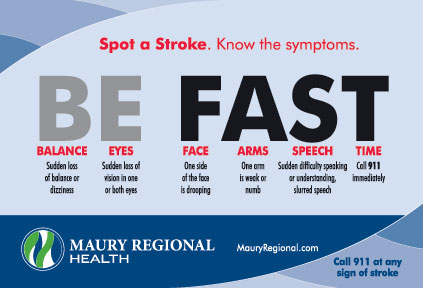.jpg)
STROKE Services

Maury Regional Medical Center is recognized with certification as an Advanced Primary Stroke Center by The Joint Commission and American Heart Association/American Stroke Association. Physicians providing care include Maury Regional Medical Group (MRMG) hospital-based neurologists, a neurosurgeon and orthopedic surgeons. Services include:
- Stroke treatment and follow-up care
- Spinal injury or disease treatment
- Brain injury or disease treatment
Our affiliate hospitals Marshall Medical Center in Lewisburg and Wayne Medical Center in Waynesboro are equipped to stabilize and provide timely medications to those experiencing a stroke. Always call 911 when stroke is suspected to initiate an emergency response.
Life-Saving Stroke Technology
Maury Regional Medical Center utilitizes technology to enhance our ability to treat stroke patients. The RAPID® software works with CT to map blood flow and provide fast, fully-automated diagnostic imaging. The benefits include:
- Patients beyond the tissue plasminogen activator (tPA) window can be scanned quickly to determine if they are a candidate for clot retrieval.
- RAPID CTP provides perfusion maps to accurately identify reduced blood flow, cerebral volume and transit time.
- RAPID CTA automatically delivers CT angiography maps and identifies brain regions with reduced blood vessel density in 2D and 3D views.
- The RAPID mobile app allows physicians to preview results on HIPPAA-compliant mobile technology and make clinical decisions quickly.
IF You were having a stroke, would you know?
A stroke occurs when a vessel in the brain is blocked by a blood clot or ruptures. Stroke is the fifth leading cause of death and the leading cause of permanent disability in the U.S. According to the American Stroke Association, high blood pressure is the leading cause of stroke and the most significant controllable risk factor. Talk to your primary care physician about your risks. Risk factors include:
- High blood pressure
- Cigarette smoking
- Atrial fibrillation
- Diabetes
- Diet
- Obesity
- High blood cholesterol
- Carotic artery disease
- Peripheral artery disease
- Other heart disease
- Sickle cell disease
At Maury Regional Medical Center, board-certified neurologists, Emergency Department nurses and ICU nurses are specially trained in stroke care.
Maury Regional Physical Therapy also offers comprehensive neurological rehabilitation, including occupational, physical and speech therapy.
COMMON SIGNS OF STROKE
The American Stroke Association encourages BE FAST as an easy way to remember the sudden signs of stroke and when to call 911.
- Balance - Sudden loss of balance or dizziness
- Eyes - Sudden loss of vision in one or both eyes
- Face - One side of the face is drooping
- Arms - One arm is weak or numb
- Speech - Sudden difficulty speaking or understanding, slurred speech
- Time - Call 911 immediately
The faster you seek medical help, the better your chances for recovery. Clot-dissolving drugs have the potential to dramatically reduce long-term disability if given within three hours of having a stroke or up to 4.5 hours in certain eligible patients. Another procedure called mechanical thrombectomy is available at comprehensive stroke centers in eligible patients up to 24 hours of stroke onset. Even if symptoms are brief and end quickly, it could be a warning sign for a major stroke. Stroke is a serious medical emergency and quick response can make all the difference.
